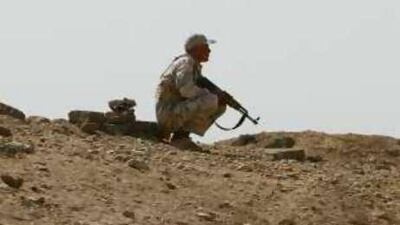KHANAGIN, IRAQ // The streets are quieter now, the boiling tensions of a month ago have faded. But they have not disappeared entirely and remain, simmering away, not far beneath the surface. In the late summer it looked as if the struggle for power between Kurds and Arabs in Khanaqin could break out into open warfare. Kurdish soldiers, the Peshmerga, were controlling this city 150km north-east of Baghdad and the Iraqi government decided to send in its own troops to take charge. There was a standoff and fevered talk of Arab Iraqi troops going to war with Kurdish Iraqi troops - a nightmare scenario.
That was averted - or at least postponed - when Arab and Kurdish leaders reached a compromise that meant neither force stayed in the city, leaving security up to locally recruited police. Having stepped back from the brink, however, many fundamental issues remain unresolved. The Kurdish authorities insist Khanaqin is a Kurdish town and should be part of their autonomously run northern zone. Arab Iraqis in Baghdad insist it must remain part of the centrally administered area, and accuse the Kurds of discriminating against its Arab minorities. In the centre of this nondescript town of some 150,000 people, a Kurdish resident who asked to be named only as Barshad said it would never submit to Baghdad's control. "There are equal rights here between the Arabs and Kurds," Barshad, 32, said. "The Kurds are not trying to claim the whole of the city and push Arabs out. "But we are the majority and do not want to be under the control of the Iraqi government. We are Kurdish, we have a different language and culture and we will stand against attempts by the government to control us here." A majority of city residents apparently share those sentiments. Kurds staged a large public demonstration against the Iraqi government's plans to send in troops. However, members of the city's Arab and Turkoman minorities said they felt under threat from the Kurds and were treated as second-class citizens. Few were prepared to talk openly about it, but in the Kahrnez neighbourhood, Abu Ahmad Turkmani said problems have been on the rise. "There are only eight Turkomen households here now," he said. "We've been pushed into a corner. Not openly but in quiet ways. I'm a trader and have a much harder time of things than Kurds in the same business." The 45-year-old merchant claimed that while Kurds faced few obstructions from the local authorities, he was constantly facing hold-ups and inspections by the Asaiysh, the Kurdish secret police. "I'm always getting them coming round to inspect my merchandise and they'll say it doesn't have the right permits, or is not valid, even though I source it from the same suppliers as the Kurds." In terms of business, he said, the situation was easier under Saddam Hussein, who carried out a forcible migration policy in such towns as Khanaqin, pushing in Arabs and pushing out Kurds. Mr Turkmani said Kurds and Arabs were living in an unstable peace, pointing to a spate of bombings and murders. "There are problems here between Arabs and Kurds," he said. "There are killings, there is a competition for power here. "Years ago there were more Arabs but many of them have left. These are not problems between the ordinary citizens. It's something that comes from the political parties. All any of us want is to live quietly and peacefully and to have work." He was adamant that Khanaqin, a city with valuable oil resources, should fall under the auspices of Baghdad, not the Kurd's administrative capital, Erbil. "The minorities here want to be part of Iraq, not part of Kurdistan. Only with the central government will our rights get protected." Similar contests are being played out in other towns along the frontiers between the Kurdish and Arab zones. There is no clear border and ethnically mixed towns, such as Khanaqin and Jalawla in Diyala province, are often volatile. Kirkuk is the most obvious, high-stakes example. It is the richest, biggest city under dispute. The United Nations has been drafted to come up with power-sharing recommendations and, although the issue of Kirkuk is still under consideration, the UN has said some smaller contested areas claimed by the Kurds should, in fact, stay outside of Kurdish Regional Government hands. In Khanaqin, the situation remains uneasy. And it is not without its unexpected complexities. One Kurdish resident, 25-year-old Ahmed Abbas, said he was tired of Kurdish political parties trying to claim the area. "Arabs and Kurds have lived here without too many problems for years," he said. "The Arabs haven't tried to take over the town but the Kurds have. I've lived in Khanaqin all my life and now that the Kurds out of Erbil want to take over they treat the local Kurds as second class. The Kurds have been forcing Arabs from their homes and that's not right. They just want a Kurdish monopoly." Politicians were more interested in personal prestige than the real interests of locals, he said, insisting Khanaqin should be under the authority of Baghdad. "This is an Iraqi city, and our government is in the capital." nlatif@thenational.ae

